General Sir John Monash, Personal Files Book 17, 11 February - 18 March 1918, Part 12
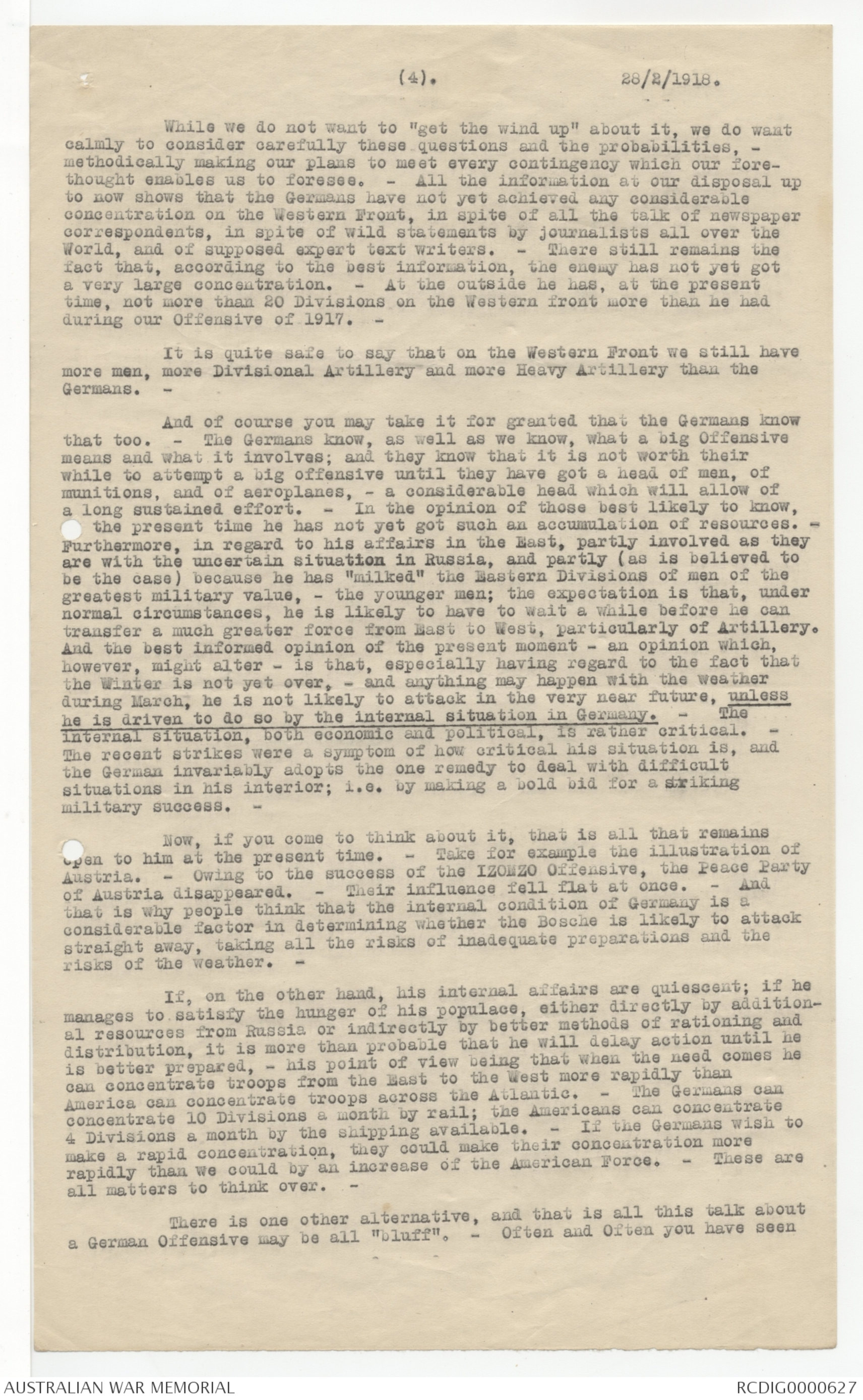
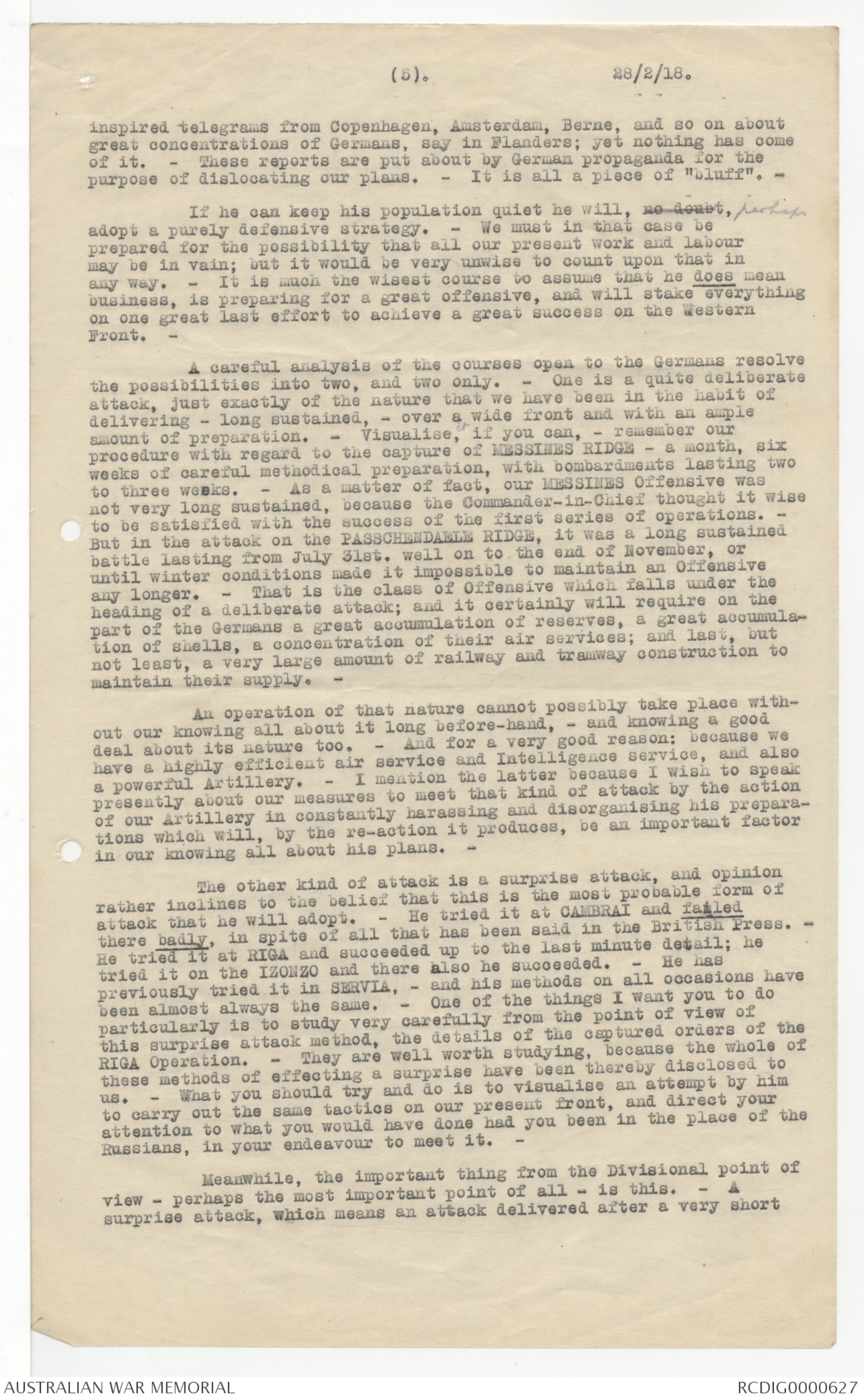
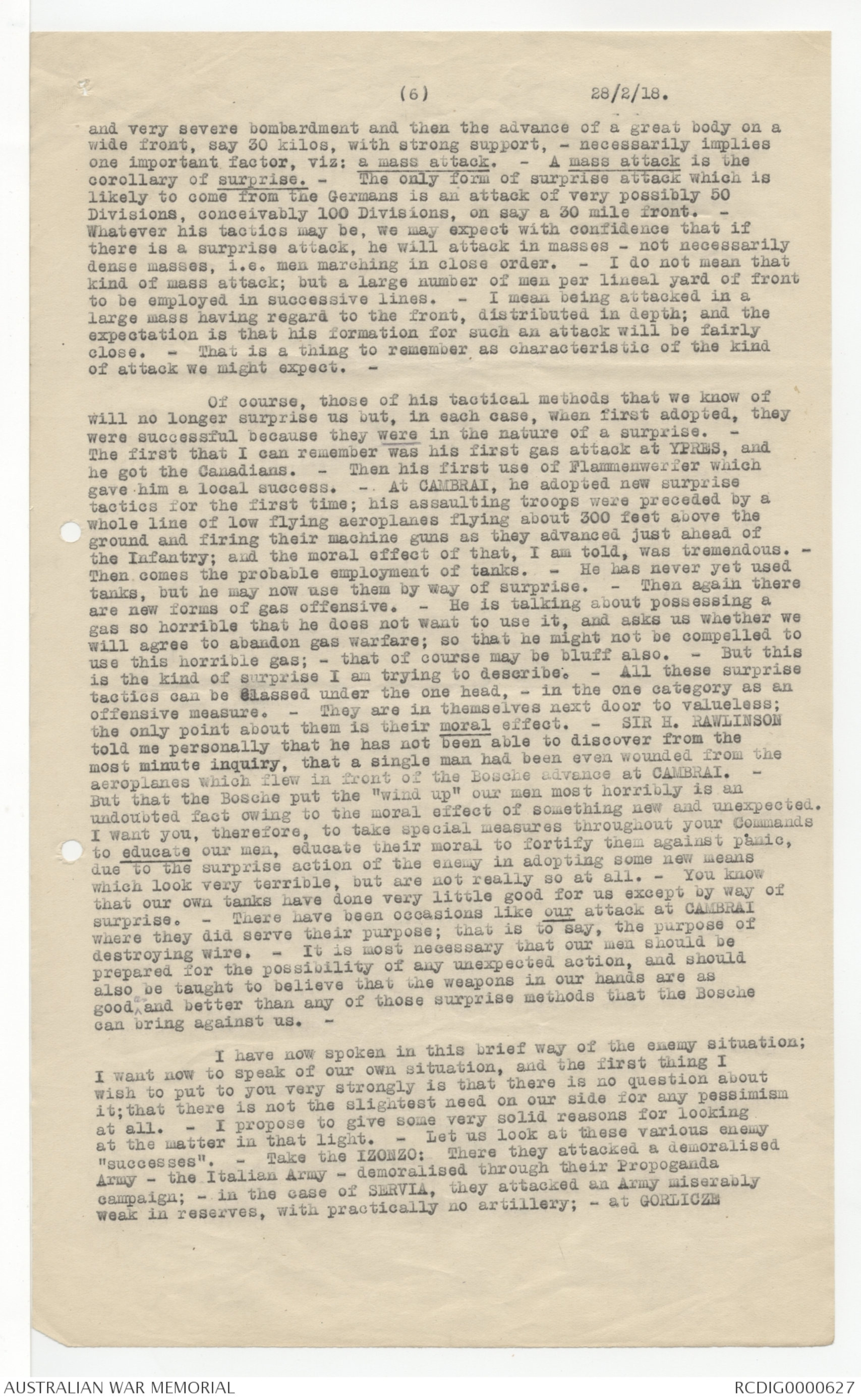
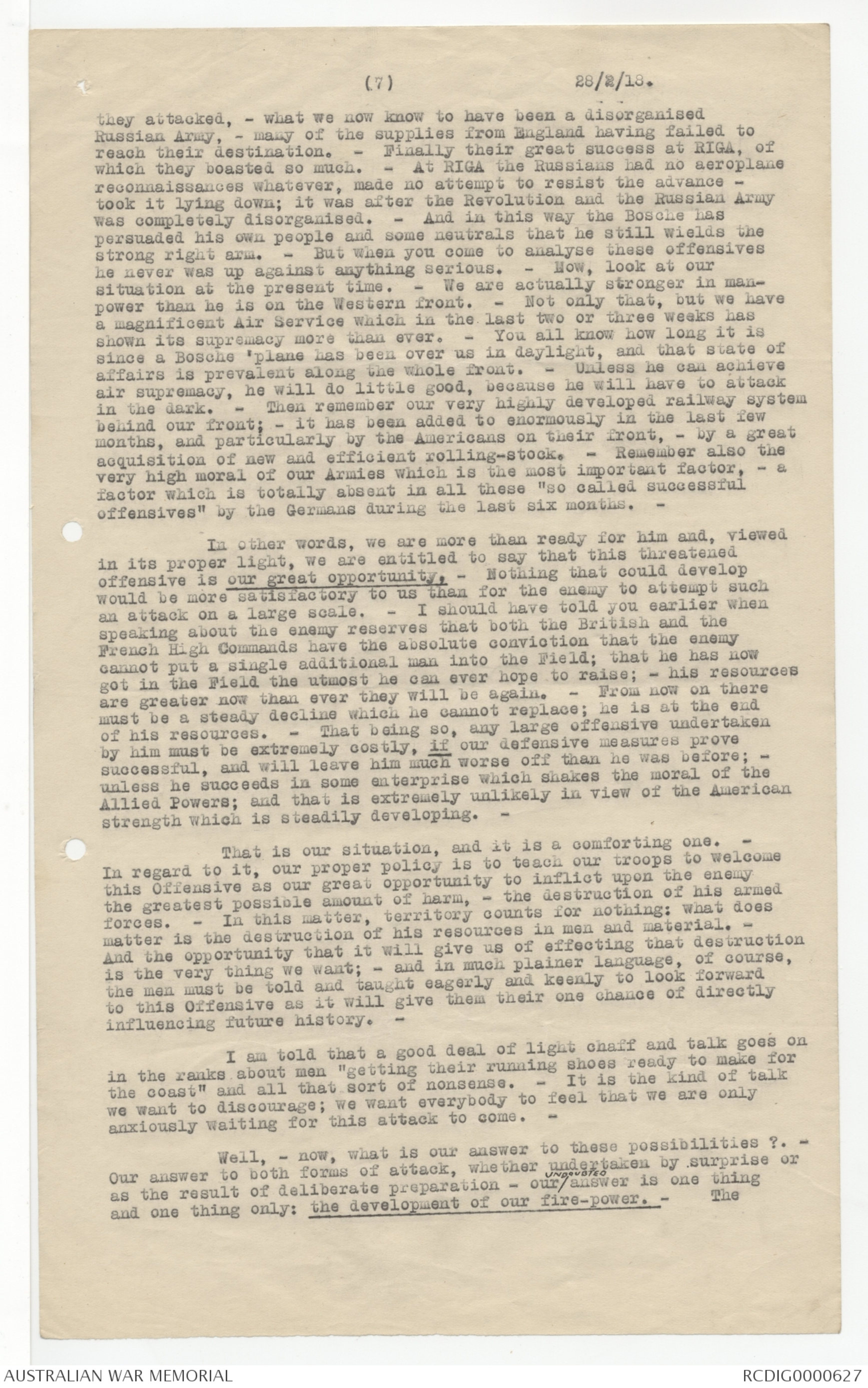
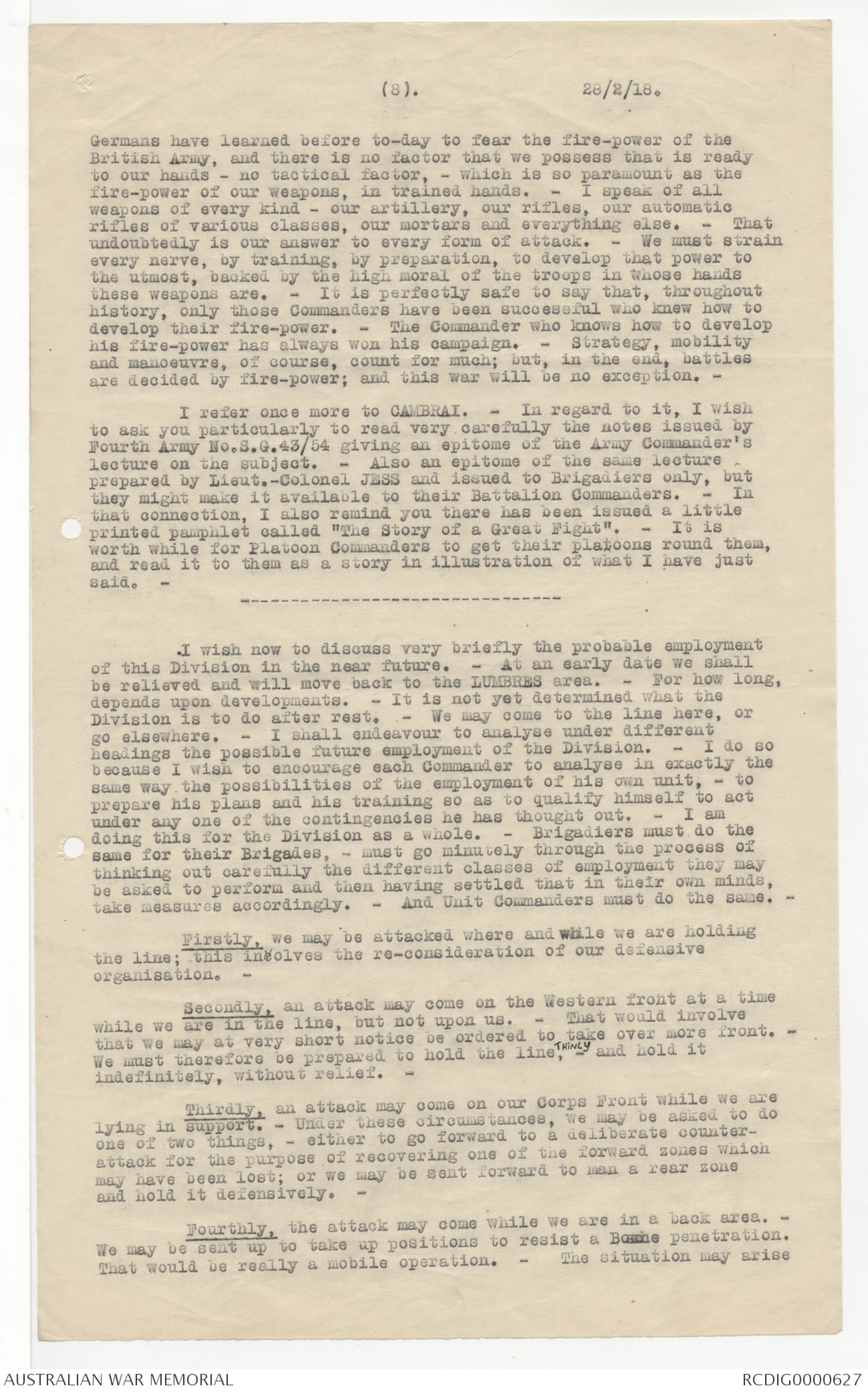
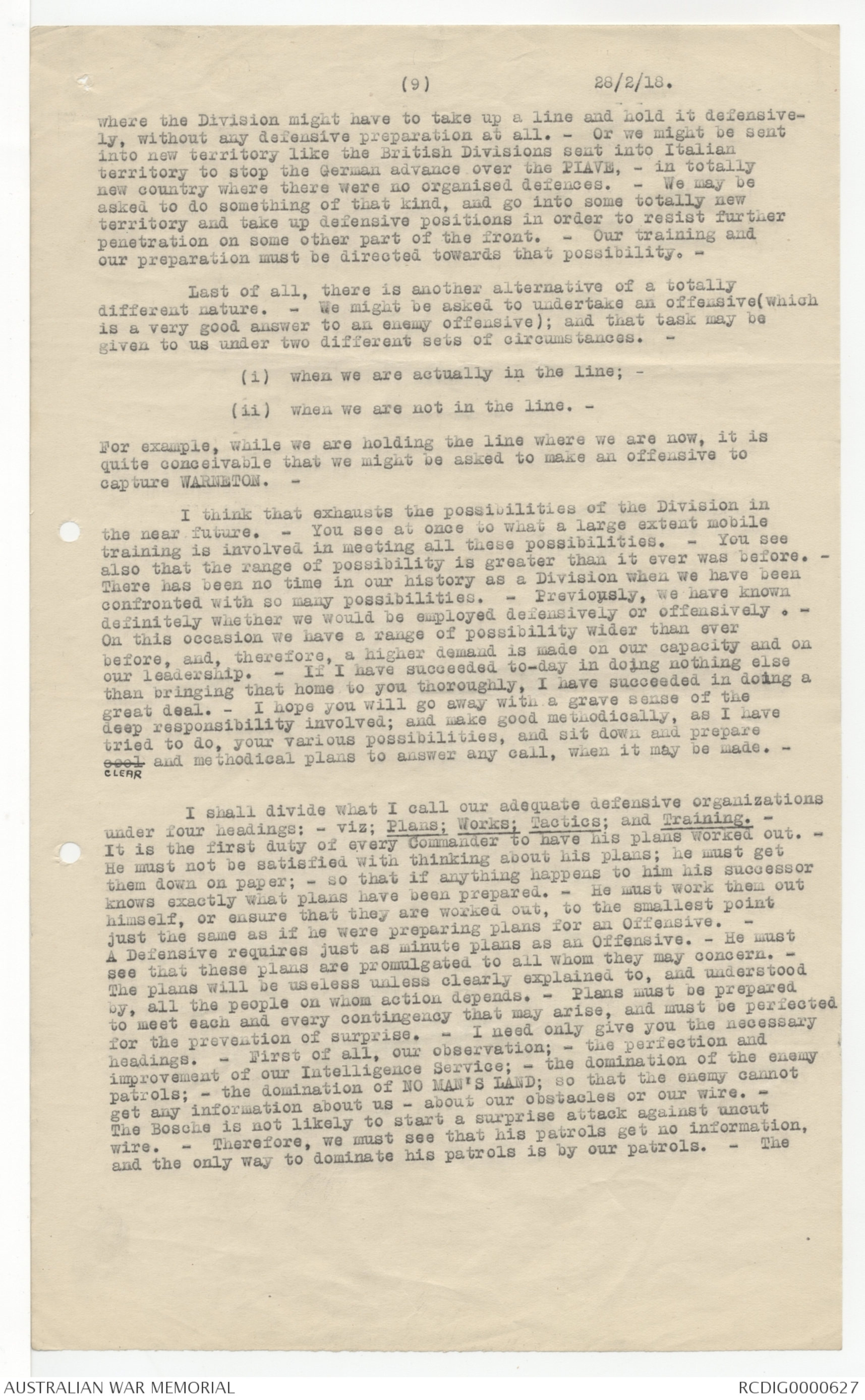
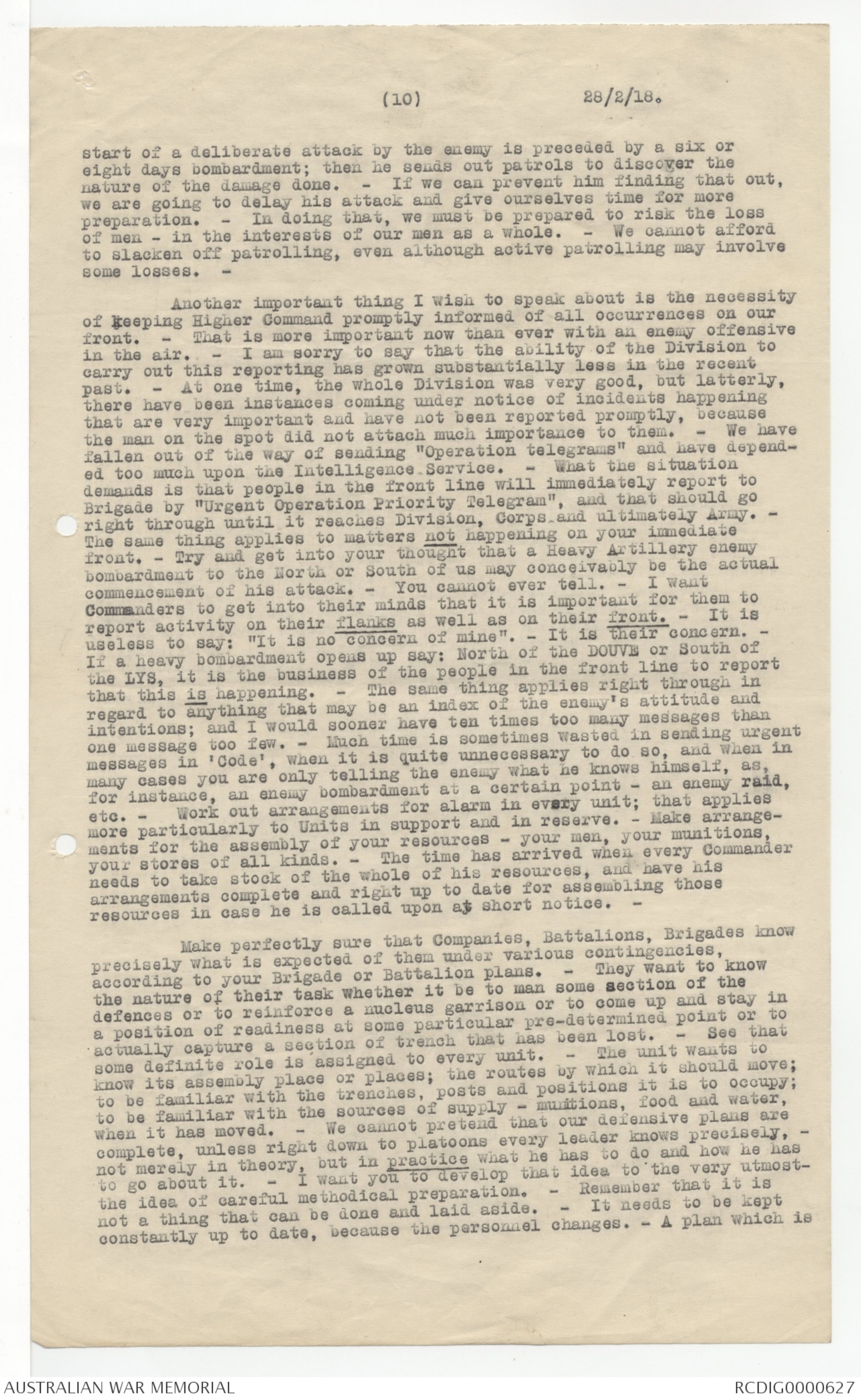
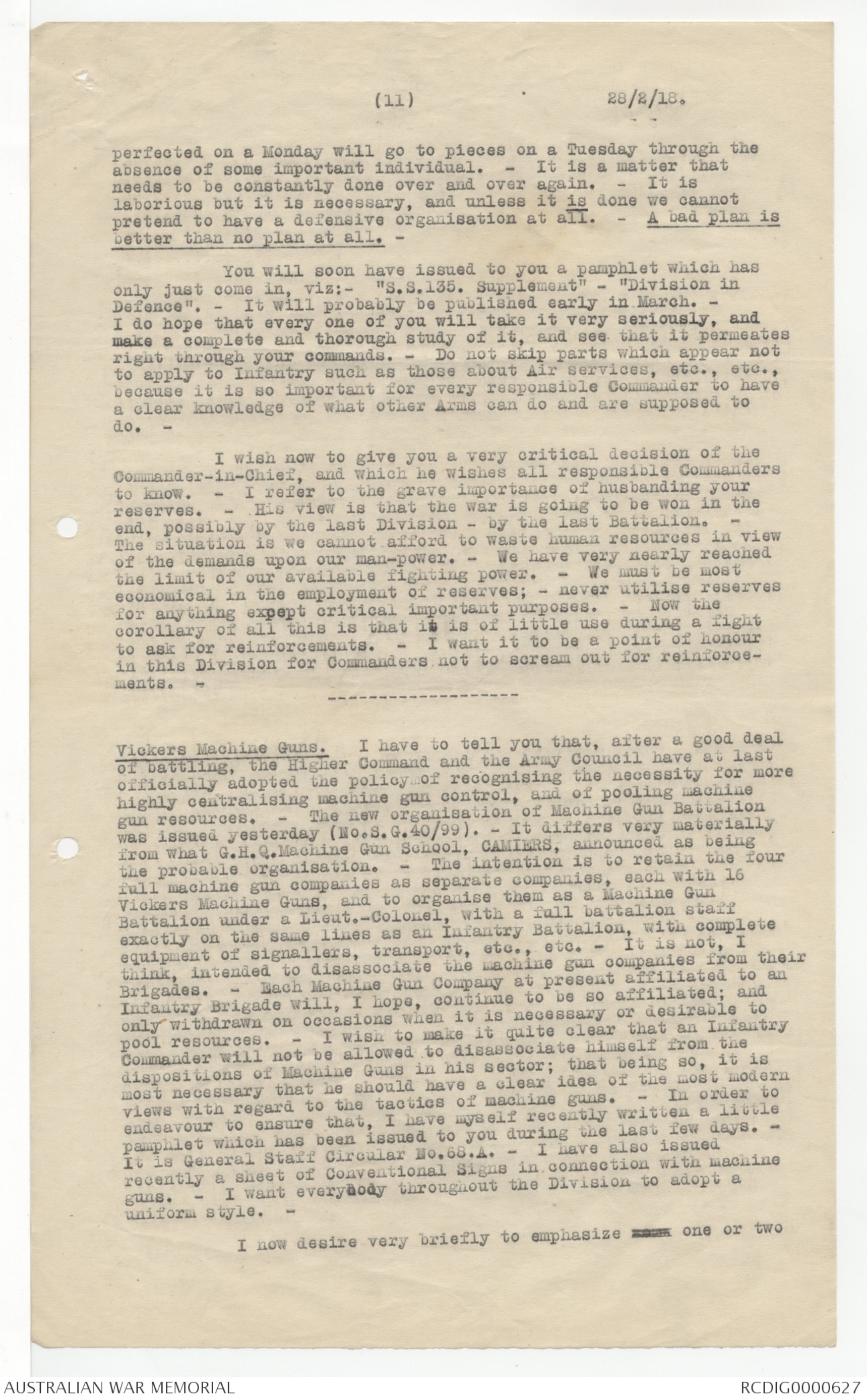
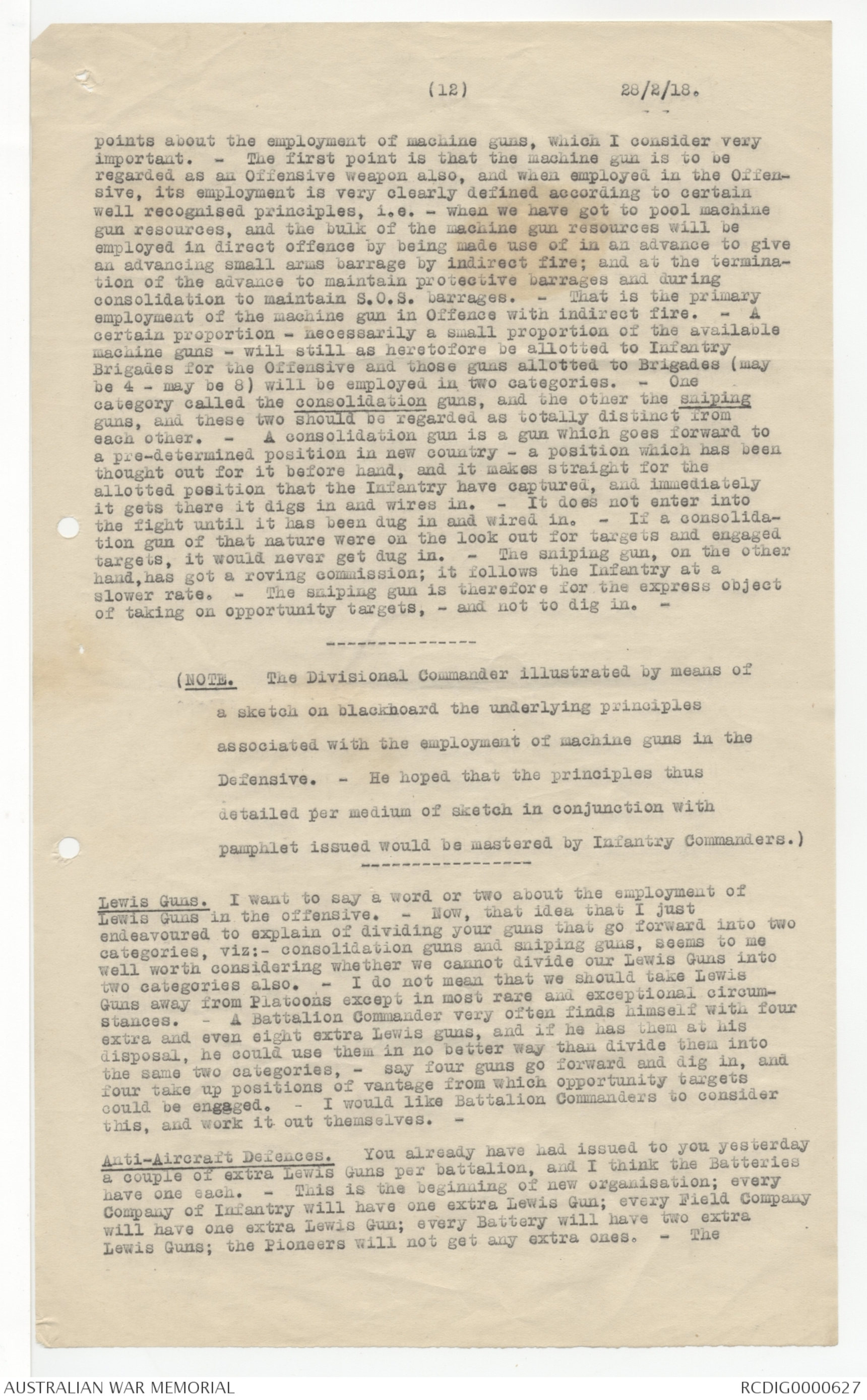
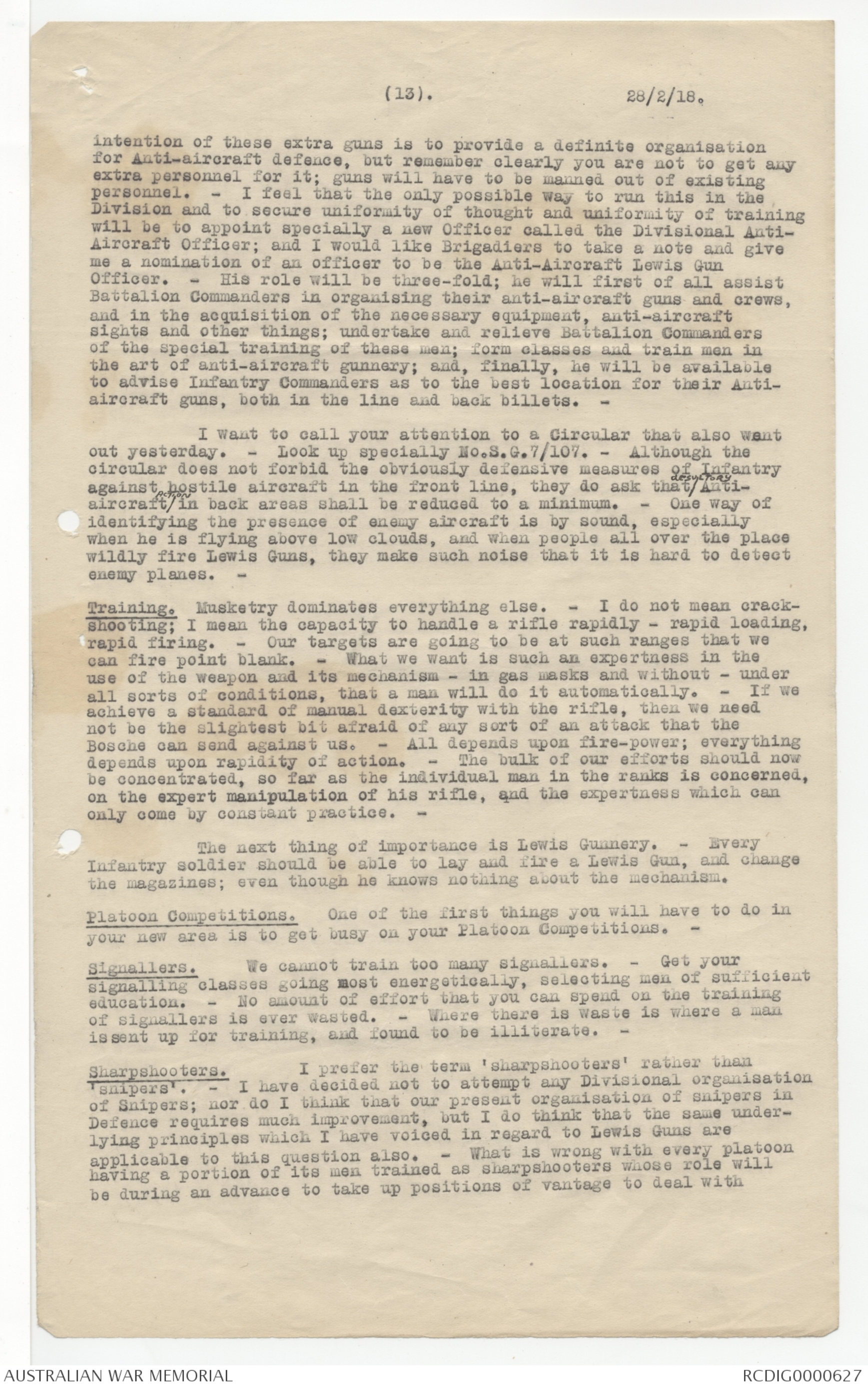
(4). 28/2/1918.
While we do not want to "get the wind up" about it, we do want
calmly to consider carefully these questions and the probabilities, -
methodically making our plans to meet every contingency which our
forethought enables us to foresee. - All the information at our disposal up
to now shows that the Germans have not yet achieved any considerable
concentration on the Western Front, in spite of all the talk of newspaper
correspondents, in spite of wild statements by journalists all over the
World, and of supposed expert text writers. - There still remains the
fact that, according to the best information, the enemy has not yet got
a very large concentration. - At the outside he has, at the present
time, not more than 20 Divisions on the Western front more than he had
during our Offensive of 1917.
It is quite safe to say that on the Western Front we still have
more men, more Divisional Artillery and more Heavy Artillery than the
Germans. -
And of course you may take it for granted that the Germans know
that too. - The Germans know, as well as we know, what a big Offensive
means and what it involves; and they know that it is not worth their
while to attempt a big offensive until they have got a head of men, of
munitions, and of aeroplanes, - a considerable head which will allow of
a long sustained effort. - In the opinion of those best likely to know,
the present time he has not yet got such an accumulation of resources. -
Furthermore, in regard to his affairs in the East, partly involved as they
are with the uncertain situation in Russia, and partly (as is believed to
be the case) because he has "milked" the Eastern Divisions of men of the
greatest military value, - the younger men; the expectation is that, under
normal circumstances, he is likely to have to wait a while before he can
transfer a much greater force from East to West, particularly of Artillery.
And the best informed opinion of the present moment - an opinion which,
however, might alter - is that, especially having regard to the fact that
the Winter is not yet over, - and anything may happen with the weather
during March, he is not likely to attack in the very near future, unless
he is driven to do so by the internal situation in Germany. The
Internal situation, both economic and political, Is rather critical. -
The recent strikes were a symptom of how critical his situation is, and
the German invariably adopts the one remedy to deal with difficult
situations in his interior; i.e. by making a bold bid for a striking
military success. -
Now, if you come to think about it, that is all that remains
open to him at the present time. - Take for example the illustration of
Austria. - Owing to the success of the IZONZO Offensive, the Peace Party
of Austria disappeared. Their influence fell flat at once. - And
that is why people think that the internal condition of Germany is a
considerable factor in determining whether the Bosche is likely to attack
straight away, taking all the risks of inadequate preparations and the
risks of the weather. -
If, on the other hand, his internal affairs are quiescent; if he
manages to satisfy the hunger of his populace, either directly by additional
resources from Russia or indirectly by better methods of rationing and
distribution, it is more than probable that he will delay action until he
is better prepared, - his point of view being that when the need comes he
can concentrate troops from the East to the West more rapidly than
America can concentrate troops across the Atlantic. - The Germans can
concentrate 10 Divisions a month by rail; the Americans can concentrate
4 Divisions a month by the shipping available. - If the Germans wish to
make a rapid concentration, they could make their concentration more
rapidly than we could by an increase of the American Force. These are
all matters to think over. -
There is one other alternative, and that is all this talk about
a German Offensive may be all "bluff". - Often and Often you have seen
(5). 28/2/18.
inspired telegrams from Copenhagen, Amsterdam, Berne, and so on about
great concentrations of Germans, say in Flanders; yet nothing has come
of it. - These reports are put about by German propaganda for the
purpose of dislocating our plans. - It is all a piece of "bluff". -
If he can keep his population quiet he will, no douet, perhaps
adopt a purely defensive strategy. - We must in that case be
prepared for the possibility that all our present work and labour
may be in vain; but it would be very unwise to count upon that in
any way. - It is much the wisest course to assume that he does mean
business, is preparing for a great offensive, and will stake everything
on one great last effort to achieve a great success on the Western
Front. -
A careful analysis of the courses open to the Germans resolve
the possibilities into two, and two only. - One is a quite deliberate
attack, just exactly of the nature that we have been in the habit of
delivering - long sustained, - over a wide front and with an ample
amount of preparation. - Visualise it, if you can, - remember our
procedure with regard to the capture of MESSINES RIDGE - a month, six
weeks of careful methodical preparation, with bombardments lasting two
to three weeks. - As a matter of fact, our MESSINES Offensive was
not very long sustained, because the Commander-in-Chief thought it wise
to be satisfied with the success of the first series of operations. -
But in the attack on the PASSCHENDAELE RIDGE, it was a long sustained
battle lasting from July 31st. well on to the end of November, or
until winter conditions made it impossible to maintain an Offensive
any longer. - That is the class of Offensive which falls under the
heading of a deliberate attack; and it certainly will require on the
part of the Germans a great accumulation of reserves, a great accumulation
of shells, a concentration of their air services; and last, but
not least, a very large amount of railway and tramway construction to
maintain their supply. -
An operation of that nature cannot possibly take place without
our knowing all about it long before-hand, - and knowing a good
deal about its nature too. - And for a very good reason: because we
have a highly efficient air service and Intelligence service, and also
a powerful Artillery. - I mention the latter because I wish to speak
presently about our measures to meet that kind of attack by the action
of our Artillery in constantly harassing and disorganising his preparations
which will, by the re-action it produces, be an important factor
in our knowing all about his plans. -
The other kind of attack is a surprise attack, and opinion
rather inclines to the belief that this is the most probable form of
attack that he will adopt. - He tried it at CAMBRAI and failed
there badly, in spite of all that has been said in the British Press. -
He tried it at RIGA and succeeded up to the last minute detail; he
tried it on the IZONZO and there also he succeeded. - He has
previously tried it in SERVIA, - and his methods on all occasions have
been almost always the same. - One of the things I want you to do
particularly is to study very carefully from the point of view of
this surprise attack method, the details of the captured orders of the
RIGA Operation. - They are well worth studying, because the whole of
these methods of effecting a surprise have been thereby disclosed to
us. - What you should try and do is to visualise an attempt by him
to carry out the same tactics on our present front, and direct your
attention to what you would have done had you been in the place of the
Russians, in your endeavour to meet it. -
Meanwhile, the important thing from the Divisional point of
view - perhaps the most important point of all - is this. - A
surprise attack, which means an attack delivered after a very short
(6) 28/2/18.
and very severe bombardment and then the advance of a great body on a
wide front, say 30 kilos, with strong support, - necessarily implies
one important factor, viz: a mass attack. - A mass attack is the
corollary of surprise The only form of surprise attack which is
likely to come from the Germans is an attack of very possibly 50
Divisions, conceivably 100 Divisions, on say a 30 mile front. -
Whatever his tactics may be, we may expect with confidence that if
there is a surprise attack, he will attack in masses - not necessarily
dense masses, i.e. men marching in close order. - I do not mean that
kind of mass attack; but a large number of men per lineal yard of front
to be employed in successive lines. - I mean being attacked in a
large mass having regard to the front, distributed in depth; and the
expectation is that his formation for such an attack will be fairly
close. - That is a thing to remember as characteristic of the kind
of attack we might expect. -
Of course, those of his tactical methods that we know of
will no longer surprise us but, in each case, when first adopted, they
were successful because they were in the nature of a surprise. -
The first that I can remember was his first gas attack at YPRES, and
he got the Canadians. - Then his first use of Flammenwerfer which
gave him a local success. - At CAMBRAI, he adopted new surprise
tactics for the first time; his assaulting troops were preceded by a
whole line of low flying aeroplanes flying about 300 feet above the
ground and firing their machine guns as they advanced just ahead of
the Infantry; and the moral effect of that, I am told, was tremendous. -
Then comes the probable employment of tanks. - He has never yet used
tanks, but he may now use them by way of surprise. - Then again there
are new forms of gas offensive. - He is talking about possessing a
gas so horrible that he does not want to use it, and asks us whether we
will agree to abandon gas warfare; so that he might not be compelled to
use this horrible gas; - that of course may be bluff also. - But this
is the kind of surprise I am trying to describe. - All these surprise
tactics can be classed under the one head, - in the one category as an
offensive measure. - They are in themselves next door to valueless;
the only point about them is their moral effect. - SIR H. RAWLINSON
told me personally that he has not been able to discover from the
most minute inquiry, that a single man had been even wounded from the
aeroplanes which flew in front of the Bosche advance at CAMBRAI.
But that the Bosche put the "wind up" our men most horribly is an
undoubted fact owing to the moral effect of something new and unexpected.
I want you, therefore, to take special measures throughout your Commands
to educate our men, educate their moral to fortify them against panic,
due to the surprise action of the enemy in adopting some new means
which look very terrible, but are not really so at all. - You know
that our own tanks have done very little good for us except by way of
surprise. - There have been occasions like our attack at CAMBRAI
where they did serve their purpose; that is to say, the purpose of
destroying wire. - It is most necessary that our men should be
prepared for the possibility of any unexpected action, and should
also be taught to believe that the weapons in our hands are as
good, and better than any of those surprise methods that the Bosche
can bring against us. -
I have now spoken in this brief way of the enemy situation;
I want now to speak of our own situation, and the first thing I
wish to put to you very strongly is that there is no question about
it; that there is not the slightest need on our side for any pessimism
at all. - I propose to give some very solid reasons for looking
at the matter in that light.- Let us look at these various enemy
"successes". Take the IZONZO: There they attacked a demoralised
Army - the Italian Army - demoralised through their Propoganda
campaign; - in the case of SERVIA, they attacked an Army miserably
weak in reserves, with practically no artillery; - at GORLICZE
(7) 28/2/18.
they attacked, - what we now know to have been a disorganised
Russian Army, - many of the supplies from England having failed to
reach their destination. - Finally their great success at RIGA, of
which they boasted so much. - At RIGA the Russians had no aeroplane
reconnaissances whatever, made no attempt to resist the advance -
took it lying down; it was after the Revolution and the Russian Army
was completely disorganised. - And in this way the Bosche has
persuaded his own people and some neutrals that he still wields the
strong right arm. - But when you come to analyse these offensives
he never was up against anything serious. - Now, look at our
situation at the present time. - We are actually stronger in manpower
than he is on the Western front. - Not only that, but we have
a magnificent Air Service which in the last two or three weeks has
shown its supremacy more than ever. - You all know how long it is
since a Bosche 'plane has been over us in daylight, and that state of
affairs is prevalent along the whole front. - Unless he can achieve
air supremacy, he will do little good, because he will have to attack
in the dark. Then remember our very highly developed railway system
behind our front; - it has been added to enormously in the last few
months, and particularly by the Americans on their front, - by a great
acquisition of new and efficient rolling-stock. - Remember also the
very high moral of our Armies which is the most important factor, - a
factor which is totally absent in all these "so called successful
offensives" by the Germans during the last six months. -
In other words, we are more than ready for him and, viewed
in its proper light, we are entitled to say that this threatened
offensive is our great opportunity, - Nothing that could develop
would be more satisfactory to us than for the enemy to attempt such
an attack on a large scale, - I should have told you earlier when
speaking about the enemy reserves that both the British and the
French High Commands have the absolute conviction that the enemy
cannot put a single additional man into the Field; that he has now
got in the Field the utmost he can ever hope to raise; - his resources
are greater now than ever they will be again. - From now on there
must be a steady decline which he cannot replace; he is at the end
of his resources. - That being so, any large offensive undertaken
by him must be extremely costly, if our defensive measures prove
successful, and will leave him much worse off than he was before; -
unless he succeeds in some enterprise which shakes the moral of the
Allied Powers; and that is extremely unlikely in view of the American
strength which is steadily developing. -
That is our situation, and it is a comforting one. -
In regard to it, our proper policy is to teach our troops to welcome
this Offensive as our great opportunity to inflict upon the enemy
the greatest possible amount of harm, - the destruction of his armed
forces. - In this matter, territory counts for nothing; what does
matter is the destruction of his resources in men and material. -
And the opportunity that it will give us of effecting that destruction
is the very thing we want; - and in much plainer language, of course,
the men must be told and taught eagerly and keenly to look forward
to this Offensive as it will give them their one chance of directly
influencing future history. -
I am told that a good deal of light chaff and talk goes on
in the ranks about men "getting their running shoes ready to make for
the coast" and all that sort of nonsense. It is the kind of talk
we want to discourage; we want everybody to feel that we are only
anxiously waiting for this attack to come. -
Well, - now, what is our answer to these possibilities ? -
Our answer to both forms of attack, whether undertaken by surprise or
as the result of deliberate preparation - our/undevoted answer is one thing
and one thing only: the development of our fire-power. - The
(8). 28/2/18.
Germans have learned before to-day to fear the fire-power of the
British Army, and there is no factor that we possess that is ready
to our hands - no tactical factor, - which is so paramount as the
fire-power of our weapons, in trained hands. - I speak of all
weapons of every kind - our artillery, our rifles, our automatic
rifles of various classes, our mortars and everything else. - That
undoubtedly is our answer to every form of attack. - We must strain
every nerve, by training, by preparation, to develop that power to
the utmost, backed by the high moral of the troops in whose hands
these weapons are. - It is perfectly safe to say that, throughout
history, only those Commanders have been successful who knew how to
develop their fire-power. -The Commander who knows how to develop
his fire-power has always won his campaign. - Strategy, mobility
and manoeuvre, of course, count for much; but, in the end, battles
are decided by fire-power; and this war will be no exception. -
I refer once more to CAMBRAI. - In regard to it, I wish
to ask you particularly to read very carefully the notes issued by
Fourth Army No.S.G.43/54 giving an epitome of the Army Commander's
lecture on the subject. - Also an epitome of the same lecture
prepared by Lieut.-Colonel JESS and issued to Brigadiers only, but
they might make it available to their Battalion Commanders. - In
that connection, I also remind you there has been issued a little
printed pamphlet called "The Story of a Great Fight". - It is
worth while for Platoon Commanders to get their platoons round them,
and read it to them as a story in illustration of what I have just
said. -
I wish now to discuss very briefly the probable employment
of this Division in the near future. - At an early date we shall
be relieved and will move back to the LUMBRES area. - For how long,
depends upon developments. - It is not yet determined what the
Division is to do after rest.- We may come to the line here, or
go elsewhere. - I shall endeavour to analyse under different
headings the possible future employment of the Division. - I do so
because I wish to encourage each Commander to analyse in exactly the
same way the possibilities of the employment of his own unit, - to
prepare his plans and his training so as to qualify himself to act
under any one of the contingencies he has thought out. - I am
doing this for the Division as a whole. - Brigadiers must do the
same for their Brigades, - must go minutely through the process of
thinking out carefully the different classes of employment they may
be asked to perform and then having settled that in their own minds,
take measures accordingly. - And Unit Commanders must do the same. -
Firstly, We may be attacked where and while we are holding
the line; this involves the re-consideration of our defensive
organisation. -
Secondly, an attack may come on the Western front at a time
while we are in the line, but not upon us. That would involve
that we may at very short notice be ordered to take over more front. -
We must therefore be prepared to hold the line and hold it
indefinitely, without relief. -
Thirdly, an attack may come on our Corps Front while we are
lying in support. - Under these circumstances, we may be asked to do
one of two things, - either to go forward to a deliberate counter-attack
for the purpose of recovering one of the forward zones which
may have been lost; or we may be sent forward to man a rear zone
and hold it defensively. -
Fourthly, the attack may come while we are in a back area. -
We may be sent up to take up positions to resist a Bosche penetration.
That would be really a mobile operation. The situation may arise
(9) 28/2/18.
where the Division might have to take up a line and hold it defensively,
without any defensive preparation at all. - Or we might be sent
into new territory like the British Divisions sent into Italian
territory to stop the German advance over the PIAVE, - in totally
new country where there were no organised defences. - We may be
asked to do something of that kind, and go into some totally new
territory and take up defensive positions in order to resist further
penetration on some other part of the front. - Our training and
our preparation must be directed towards that possibility. -
Last of all, there is another alternative of a totally
different nature. - We might be asked to undertake an offensive (which
is a very good answer to an enemy offensive); and that task may be
given to us under two different sets of circumstances. -
(i) when we are actually in the line; -
(ii) when we are not in the line. -
For example, while we are holding the line where we are now, it is
quite conceivable that we might be asked to make an offensive to
capture WARNETON. -
I think that exhausts the possibilities of the Division in
the near future. - You see at once to what a large extent mobile
training is involved in meeting all these possibilities. - You see
also that the range of possibility is greater than it ever was before. -
There has been no time in our history as a Division when we have been
confronted with so many possibilities. - Previously, we have known
definitely whether we would be employed defensively or offensively. -
On this occasion we have a range of possibility wider than ever
before, and, therefore, a higher demand is made on our capacity and on
our leadership. - If I have succeeded to-day in doing nothing else
than bringing that home to you thoroughly, I have succeeded in doing a
great deal. - I hope you will go away with a grave sense of the
deep responsibility involved; and make good methodically, as I have
tried to do, your various possibilities, and sit down and preparecool clear and methodical plans to answer any call, when it may be made. -
I shall divide what I call our adequate defensive organizations
under four headings: - viz; Plans; Works; Tactics; and Training.-
It is the first duty of every Commander to have his plans worked out. -
He must not be satisfied with thinking about his plans; he must get
them down on paper; - so that if anything happens to him his successor
knows exactly what plans have been prepared. - He must work them out
himself, or ensure that they are worked out, to the smallest point
just the same as if he were preparing plans for an Offensive. -
A Defensive requires just as minute plans as an Offensive. - He must
see that these plans are promulgated to all whom they may concern. -
The plans will be useless unless clearly explained to, and understood
by, all the people on whom action depends. - Plans must be prepared
to meet each and every contingency that may arise, and must be perfected
for the prevention of surprise. - I need only give you the necessary
headings. - First of all, our observation; - the perfection and
improvement of our Intelligence Service; - the domination of the enemy
patrols; - the domination of NO MAN'S LAND; so that the enemy cannot
get any information about us - about our obstacles or our wire. -
The Bosche is not likely to start a surprise attack against uncut
wire. - Therefore, we must see that his patrols get no information,
and the only way to dominate his patrols is by our patrols. - The
(10) 28/2/18.
start of a deliberate attack by the enemy is preceded by a six or
eight days bombardment; then he sends out patrols to discover the
nature of the damage done. - If we can prevent him finding that out,
we are going to delay his attack and give ourselves time for more
preparation. - In doing that, we must be prepared to risk the loss
of men - in the interests of our men as a whole. We cannot afford
to slacken off patrolling, even although active patrolling may involve
some losses. -
Another important thing I wish to speak about is the necessity
of keeping Higher Command promptly informed of all occurrences on our
front. - That is more important now than ever with an enemy offensive
in the air. - I am sorry to say that the ability of the Division to
carry out this reporting has grown substantially less in the recent
past. - At one time, the whole Division was very good, but latterly,
there have been instances coming under notice of incidents happening
that are very important and have not been reported promptly, because
the man on the spot did not attach much importance to them. We have
fallen out of the way of sending "Operation telegrams" and have depended
too much upon the Intelligence. Service. - What the situation
demands is that people in the front line will immediately report to
Brigade by "Urgent Operation Priority Telegram", and that should go
right through until it reaches Division, Corps and ultimately Army. -
The same thing applies to matters not happening on your immediate
front. - Try and get into your thought that a Heavy Artillery enemy
bombardment to the North or South of us may conceivably be the actual
commencement of his attack. - You cannot ever tell. - I want
Commanders to get into their minds that it is important for them to
report activity on their flanks as well as on their front. - It is
useless to say: "It is no concern of mine". - It is their concern. -
If a heavy bombardment opens up say: North of the DOUVE or South of
the LYs, it is the business of the people in the front line to report
that this is happening. The same thing applies right through in
regard to anything that may be an index of the enemy's attitude and
intentions; and I would sooner have ten times too many messages than
one message too few. - Much time is sometimes wasted in sending urgent
messages in 'Code', when it is quite unnecessary to do so, and when in
many cases you are only telling the enemy what he knows himself, as
for instance, an enemy bombardment at a certain point - an enemy raid,
Work out arrangements for alarm in every unit; that applies
more particularly to Units in support and in reserve. - Make arrangements
etc. - for the assembly of your resources - your men, your munitions,
your stores of all kinds. - The time has arrived when every Commander
needs to take stock of the whole of his resources, and have his
arrangements complete and right up to date for assembling those
resources in case he is called upon at short notice. -
Make perfectly sure that Companies, Battalions, Brigades know
precisely what is expected of them under various contingencies,
according to your Brigade or Battalion plans. - They want to know
the nature of their task whether it be to man some section of the
defences or to reinforce a nucleus garrison or to come up and stay in
a position of readiness at some particular pre-determined point or to
actually capture a section of trench that has been lost. - See that
some definite role is assigned to every unit. - The unit wants to
know its assembly place or places; the routes by which it should move;
to be familiar with the trenches, posts and positions it is to occupy;
to be familiar with the sources of supply - munitions, food and water,
when it has moved. - We cannot pretend that our defensive plans are
complete, unless right down to platoons every leader knows precisely, -
not merely in theory, but in practice what he has to do and how he has
to go about it. - I want you to develop that idea to the very utmost-
the idea of careful methodical preparation. - Remember that it is
not a thing that can be done and laid aside. - It needs to be kept
constantly up to date, because the personnel changes. - A plan which is
(11) 28/2/18.
perfected on a Monday will go to pieces on a Tuesday through the
absence of some important individual. - It is a matter that
needs to be constantly done over and over again. - It is
laborious but it is necessary, and unless it is done we cannot
pretend to have a defensive organisation at all. A bad plan is
better than no plan at all. -
You will soon have issued to you a pamphlet which has
only just come in, viz:- "S.S.135. Supplement" - "Division in
Defence". - It will probably be published early in March. -
I do hope that every one of you will take it very seriously, and
make a complete and thorough study of it, and see that it permeates
right through your commands. - Do not skip parts which appear not
to apply to Infantry such as those about Air services, etc., etc.,
because it is so important for every responsible Commander to have
a clear knowledge of what other Arms can do and are supposed to
do. -
I wish now to give you a very critical decision of the
Commander-in-Chief, and which he wishes all responsible Commanders
to know. - I refer to the grave importance of husbanding your
reserves. - His view is that the war is going to be won in the
end, possibly by the last Division - by the last Battalion. -
The situation is we cannot afford to waste human resources in view
of the demands upon our man-power. - We have very nearly reached
the limit of our available fighting power. - We must be most
economical in the employment of reserves; - never utilise reserves
for anything expept critical important purposes. - Now the
corollary of all this is that it is of little use during a fight
to ask for reinforcements. - I want it to be a point of honour
in this Division for Commanders not to scream out for reinforcements.
Vickers Machine Guns. I have to tell you that, after a good deal
of battling, the Higher Command and the Army Council have at last
officially adopted the policy of recognising the necessity for more
highly centralising machine gun control, and of pooling machine
gun resources. - The new organisation of Machine Gun Battalion
was issued yesterday (No.S.G.40/99). - It differs very materially
from what G.H.Q. Machine Gun School, CAMIERS, announced as being
the probable organisation. - The intention is to retain the four
full machine gun companies as separate companies, each with 16
Vickers Machine Guns, and to organise them as a Machine Gun
Battalion under a Lieut.-Colonel, with a full battalion staff
exactly on the same lines as an Infantry Battalion, with complete
equipment of signallers, transport, etc., etc. - It is not, I
think, intended to disassociate the machine gun companies from their
Brigades. - Each Machine Gun Company at present affiliated to an
Infantry Brigade will, I hope, continue to be so affiliated; and
only withdrawn on occasions when it is necessary or desirable to
poól resources. - I wish to make it quite clear that an Infantry
Commander will not be allowed to disassociate himself from the
dispositions of Machine Guns in his sector; that being so, it is
most necessary that he should have a clear idea of the most modern
views with regard to the tactics of machine guns. - In order to
endeavour to ensure that, I have myself recently written a little
pamphlet which has been issued to you during the last few days. -
It is General Staff Circular No.68.A. - I have also issued
recently a sheet of Conventional Signs in connection with machine
guns. - I want everybody throughout the Division to adopt a
uniform style. -
I now desire very briefly to emphasize xxxx one or two
(12) 28/2/18.
points about the employment of machine guns, which I consider very
important. - The first point is that the machine gun is to be
regarded as an Offensive weapon also, and when employed in the Offensive.
its employment is very clearly defined according to certain
well recognised principles, i.e. - when we have got to pool machine
gun resources, and the bulk of the machine gun resources will be
employed in direct offence by being made use of in an advance to give
an advancing small arms barrage by indirect fire; and at the termination
of the advance to maintain protective barrages and during
consolidation to maintain S.O.S. barrages. - That is the primary
employment of the machine gun in Offence with indirect fire. - A
certain proportion - necessarily a small proportion of the available
machine guns - will still as heretofore be allotted to Infantry
Brigades for the Offensive and those guns allotted to Brigades (may
be 4 - may be 8) will be employed in two categories. - One
category called the consolidation guns, and the other the sniping
guns, and these two should be regarded as totally distinct from
each other. - A consolidation gun is a gun which goes forward to
a pre-determined position in new country - a position which has been
thought out for it before hand, and it makes straight for the
allotted position that the Infantry have captured, and immediately
it gets there it digs in and wires in. - It does not enter into
the fight until it has been dug in and wired in. - If a consolidation
gun of that nature were on the look out for targets and engaged
targets, it would never get dug in. The sniping gun, on the other
hand, has got a roving commission; it follows the Infantry at a
slower rate. - The sniping gun is therefore for the express object
of taking on opportunity targets, - and not to dig in. -
(NOTE. The Divisional Commander illustrated by means of
a sketch on blackboard the underlying principles
associated with the employment of machine guns in the
Defensive. - He hoped that the principles thus
detailed per medium of sketch in conjunction with
pamphlet issued would be mastered by Infantry Commanders.)
Lewis Guns. I want to say a word or two about the employment of
Lewis Guns in the offensive. - Now, that idea that I just
endeavoured to explain of dividing your guns that go forward into two
categories, viz:- consolidation guns and suiping guns, seems to me
well worth considering whether we cannot divide our Lewis Guns into
two categories also. - I do not mean that we should take Lewis
Guns away from Platoons except in most rare and exceptional
circumstances. - A Battalion Commander very often finds himself with four
extra and even eight extra Lewis guns, and if he has them at his
disposal, he could use them in no better way than divide them into
the same two categories, - say four guns go forward and dig in, and
four take up positions of vantage from which opportunity targets
could be engaged. I would like Battalion Commanders to consider
this, and work it out themselves. -
Anti-Aircraft Defences. You already have had issued to you yesterday
a couple of extra Lewis Guns per battalion, and I think the Batteries
have one each.- This is the beginning of new organisation; every
Company of Infantry will have one extra Lewis Gun; every Field Company
will have one extra Lewis Gun; every Battery will have two extra
Lewis Guns; the Pioneers will not get any extra ones. - The
(13).
28/2/18.
intention of these extra guns is to provide a definite organisation
for Anti-aircraft defence, but remember clearly you are not to get any
extra personnel for it; guns will have to be manned out of existing
personnel. - I feel that the only possible way to run this in the
Division and to secure uniformity of thought and uniformity of training
will be to appoint specially a new Officer called the Divisional Anti¬
Aircraft Officer; and I would like Brigadiers to take a note and give
me a nomination of an officer to be the Anti-Aircraft Lewis Gun
Officer. - His role will be three-fold; he will first of all assist
Battalion Commanders in organising their anti-aircraft guns and crews,
and in the acquisition of the necessary equipment, anti-aircraft
sights and other things; undertake and relieve Battalion Commanders
of the special training of these Men; form classes and train men in
the art of anti-aircraft gunnery; and, finally, he will be available
to advise Infantry Commanders as to the best location for their Anti¬
aircraft guns, both in the line and back billets. -
I want to call your attention to a Circular that also went
out yesterday. - Look up specially No.S.G.7/107. - Although the
circular does not forbid the obviously defensive measures of Infantry
against hostile aircraft in the front line, they do ask that/desultory Anti-
aircraft/action in back areas shall be reduced to a minimum. - One way of
identifying the presence of enemy aircraft is by sound, especially
when he is flying above low clouds, and when people all over the place
wildly fire Lewis Guns, they make such noise that it is hard to detect
enemy planes. -
Training. Musketry dominates everything else. - I do not mean
crack-shooting; I mean the capacity to handle a rifle rapidly - rapid loading,
rapid firing. - Our targets are going to be at such ranges that we
can fire point blank. - What we want is such an expertness in the
use of the weapon and its mechanism - in gas masks and without - under
all sorts of conditions, that a man will do it automatically. - If we
achieve a standard of manual dexterity with the rifle, then we need
not be the slightest bit afraid of any sort of an attack that the
Bosche can send against us. - All depends upon fire-power; everything
depends upon rapidity of action. - The bulk of our efforts should now
be concentrated, so far as the individual man in the ranks is concerned,
on the expert manipulation of his rifle, and the expertness which can
only come by constant practice. -
The next thing of importance is Lewis Gunnery. - Every
Infantry soldier should be able to lay and fire a Lewis Gun, and change
the magazines; even though he knows nothing about the mechanism.
Platoon Competitions. One of the first things you will have to do in
your new area is to get busy on your Platoon Competitions. -
Signallers. We cannot train too many signallers. Get your
signalling classes going most energetically, selecting men of sufficient
education. No amount of effort that you can spend on the training
of signallers is ever wasted. - Where there is waste is where a man
is sent up for training, and found to be illiterate. -
Sharpshooters. prefer the term 'sharpshooters' rather than
'snipers'. - I have decided not to attempt any Divisional organisation
of Snipers; nor do I think that our present organisation of snipers in
Defence requires much improvement, but I do think that the same
underlying principles which I have voiced in regard to Lewis Guns are
applicable to this question also. - What is wrong with every platoon
having a portion of its men trained as sharpshooters whose role will
be during an advance to take up positions of vantage to deal with
 Sam scott
Sam scottThis transcription item is now locked to you for editing. To release the lock either Save your changes or Cancel.
This lock will be automatically released after 60 minutes of inactivity.